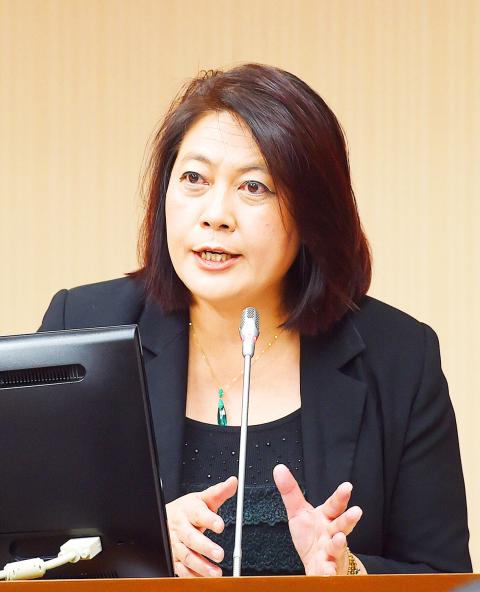National Communications Commission (NCC) Chairwoman Nicole Chan (詹婷怡) yesterday faced severe criticism from lawmakers, who said that the commission has failed to contain the spread of misinformation.
Lawmakers at the Legislative Yuan’s Transportation Committee yesterday focused on the commission’s handling of fake news, after Premier Su Tseng-chan (蘇貞昌) on Sunday accused the NCC of doing nothing about the issue.
The Satellite Broadcasting Act (衛星廣播電視法) not only authorizes the NCC to impose fines of NT$200,000 to NT$2 million (US$6,487 to US$64,868) on broadcasters that fail to verify facts and as a result hurt the public interest, but also to suspend the broadcast of programs or advertisements, or take rectification measures, Democratic Progressive Party (DDP) legislators Cheng Pao-ching (鄭寶清), Lin Chun-hsien (林俊憲) and Yeh Yi-jin (葉宜津) said.

Photo: Fang Pin-chao, Taipei Times
However, except fines, the commission has yet to use other measures permitted by the law to curb the dissemination of misinformation, they said.
So far, only TV news stations Eastern Broadcasting (東森電視) and CTiTV (中天電視) have each been fined NT$200,000 for failing to adhere to the fact-checking principles contained in the act, they said.
A false report by CTiTV that said farmers had dumped 1,200 tonnes of pomeloes into the Zengwen Reservoir (曾文水庫) last year because of low retail prices for the fruit was intended to change the outcome of Saturday’s legislative by-elections and hurt democracy, they said.
Chan should consider stepping down, as the premier, the Legislative Yuan and the public have lost trust in the commission’s ability to address misinformation, Lin said.
Chan said that all measures are designed to enhance the credibility of media, whether they are self-disciplinary mechanisms or regulations set by the authorities.
However, many cases have shown that broadcast media’s self-disciplinary mechanisms fail to produce the intended results, she said.
The commission plans to implement a series of measures to curb the dissemination of fake news by broadcast media, including asking them to incorporate fact-checking mechanisms into business plans, Chan said.
That does not mean that the NCC would interfere in the production of content, but it would allow the commission to check the procedures that TV stations have instituted to safeguard the quality of their content, she said.
The NCC’s content review committee, made up of independent experts from different academic disciplines, would convene more frequently than before to handle disputed broadcast content, Chan said.
Aside from asking broadcast media to have content reviewed by their own ethics committees, TV station managers would be asked to brief NCC commissioners in person on how certain content was produced if it receives complaints, she said.
Asked about Su’s comments, Chan said that the commission convenes and announces its rulings on different cases every week, and people can decide for themselves whether it is doing its job.
The commission would humbly accept all criticism from all parties, she said.
However, it already warned the Cabinet about the malicious effects on democratic values of misinformation and proposed possible solutions during a meeting in 2017, and the Cabinet ordered that all government departments work together to curb the spread of misinformation.
Meanwhile, former NCC chairwoman Su Herng (蘇蘅) said that Su’s top-down condemnation of the commission exposed his ignorance about the independence of the agency and was meant to pressure the NCC into doing what he said.

The manufacture of the remaining 28 M1A2T Abrams tanks Taiwan purchased from the US has recently been completed, and they are expected to be delivered within the next one to two months, a source said yesterday. The Ministry of National Defense is arranging cargo ships to transport the tanks to Taiwan as soon as possible, said the source, who is familiar with the matter. The estimated arrival time ranges from late this month to early next month, the source said. The 28 Abrams tanks make up the third and final batch of a total of 108 tanks, valued at about NT$40.5 billion

Two Taiwanese prosecutors were questioned by Chinese security personnel at their hotel during a trip to China’s Henan Province this month, the Mainland Affairs Council (MAC) said yesterday. The officers had personal information on the prosecutors, including “when they were assigned to their posts, their work locations and job titles,” MAC Deputy Minister and spokesman Liang Wen-chieh (梁文傑) said. On top of asking about their agencies and positions, the officers also questioned the prosecutors about the Cross-Strait Joint Crime-Fighting and Judicial Mutual Assistance Agreement, a pact that serves as the framework for Taiwan-China cooperation on combating crime and providing judicial assistance, Liang

A group from the Taiwanese Designers in Australia association yesterday represented Taiwan at the Midsumma Pride March in Melbourne. The march, held in the St. Kilda suburb, is the city’s largest LGBTQIA+ parade and the flagship event of the annual Midsumma Festival. It attracted more than 45,000 spectators who supported the 400 groups and 10,000 marchers that participated this year, the association said. Taiwanese Designers said they organized a team to march for Taiwan this year, joining politicians, government agencies, professionals and community organizations in showing support for LGBTQIA+ people and diverse communities. As the first country in Asia to legalize same-sex

MOTIVES QUESTIONED The PLA considers Xi’s policies toward Taiwan to be driven by personal considerations rather than military assessment, the Epoch Times reports Chinese President Xi Jinping’s (習近平) latest purge of the Chinese People’s Liberation Army (PLA) leadership might have been prompted by the military’s opposition to plans of invading Taiwan, the Epoch Times said. The Chinese military opposes waging war against Taiwan by a large consensus, putting it at odds with Xi’s vision, the Falun Gong-affiliated daily said in a report on Thursday, citing anonymous sources with insight into the PLA’s inner workings. The opposition is not the opinion of a few generals, but a widely shared view among the PLA cadre, the Epoch Times cited them as saying. “Chinese forces know full well that